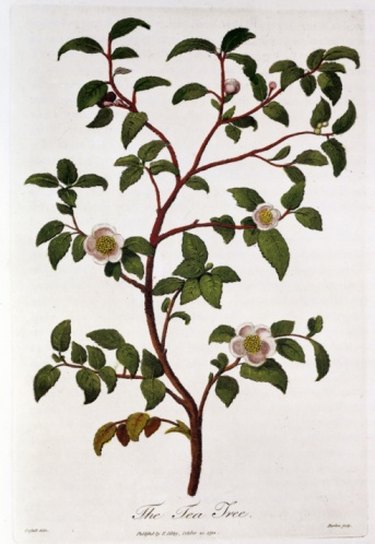
Green tea gained popularity due to its role in certain weight loss studies and its rich antioxidant content. Bottled green tea that contains artificial sweetener is marketed as "diet" green tea. Ironically, these beverages tend to be much lower in antioxidants than freshly brewed green tea. To assess whether diet green tea is bad for you, consider preliminary studies that suggest artificial sweetener may increase your appetite and contribute to obesity.
Background
Video of the Day
Green tea comes from the unfermented leaves of the Camelia sinesis plant, the same plant that produces black and oolong tea. Green tea owes its rich antioxidant content to the plant's adaptation to stress. To deal with sunlight and the process of photosynthesis -- the way plants create energy from sunlight -- the tea plant developed a high amount of chemicals called polyphenols. Polyphenols have numerous health benefits. Their antioxidant activity may reduce the risk of chronic diseases and help with weight maintenance. As with diet soda consumption, some people may tend to overestimate the calories they're saving by drinking artificially sweetened "diet" green tea and consume too many calories overall.
Video of the Day
Green Tea
Preliminary research indicates that green tea promotes weight loss and fat burning, although further research is needed. Ready to drink tea beverages of all kinds contain only 5 to 10 percent of the flavanoid level of brewed tea, according to the Agricultural Research Service. Flavanoids are antioxidants, part of the polyphenol content of green tea. This means you'd have to drink 5 to 10 bottles of diet green tea to receive the level of antioxidants in a cup of freshly brewed green tea. Consuming diet green tea occasionally may not be bad for you, but most of these products are very low in the beneficial properties of fresh tea.
Effects
Artificial sweetener may increase your appetite and contribute to weight gain, according to research published in the 2008 issue of "Obesity." Although further research is needed, and it isn't clear if consuming diet beverages causes weight gain, frequent use of sweeteners, including sweeteners that don't have calories, maylead to consuming excess calories. Just as consuming sweets tends to trigger the urge to consume more food in many people, the sweet taste of artificial sweeteners may have the same effect. If you're trying to maintain your weight, or lose weight, consuming diet green tea may be bad for you.
Considerations
If you're drinking diet green tea for a caffeine lift, you may be disappointed. A popular brand of bottled iced green tea contains only 15 mg of caffeine in a 16 oz. serving. Brewed green tea contains 24 mg in a 6 oz. cup, according to MayoClinic.com. Brewing and chilling your own green tea results in a beverage free of artificial ingredients at a fraction of the cost of bottled drinks, and using a reuseable bottle for your diet drink reduces waste. Organic green teas provide a pesticide-free option, and organically grown plants in general tend to be higher in antioxidants.
- "Agricultural Research"; Brewing Up the Latest Tea Research; Rosalie Marion Bliss; September 2003
- "Journal of Nutrition"; Green Tea Catechin Consumption Enhances Exercise-Induced Abdominal Fat Loss, Kevin Maki, et al.; 2009
- "Obesity"; Fueling the Obesity Epidemic? Artificially Sweetened Beverage Use and Long-Term Weight Gain; Sharon P. Fowler, et al.; 2008
- MayoClinic.com; Caffeine Content for Tea, Soda and More; October 2009